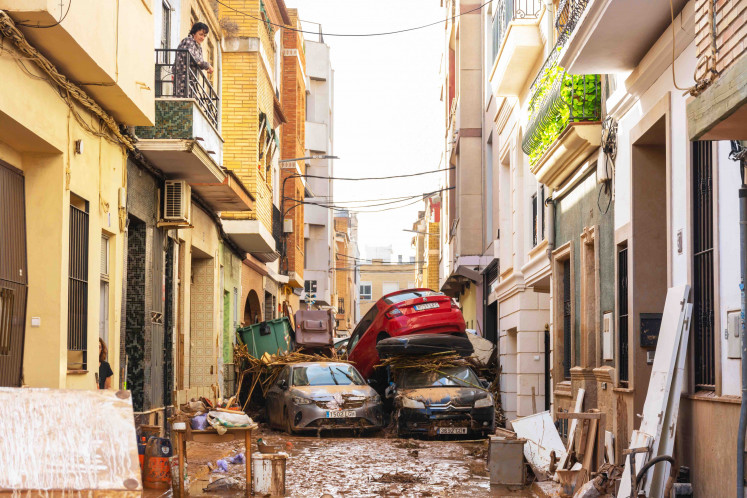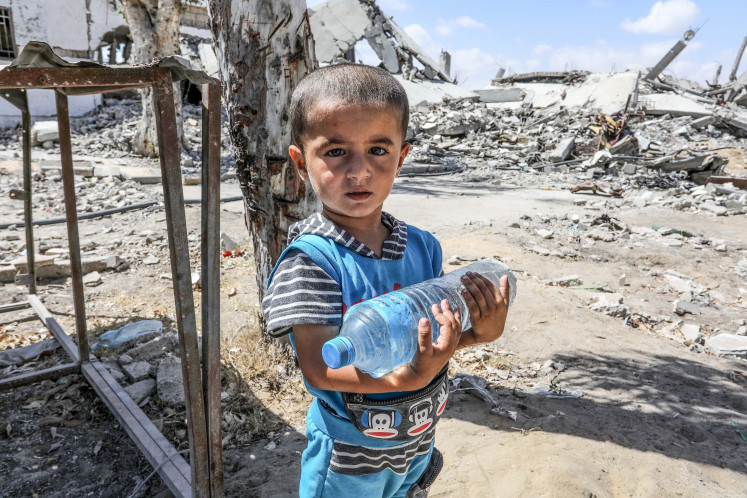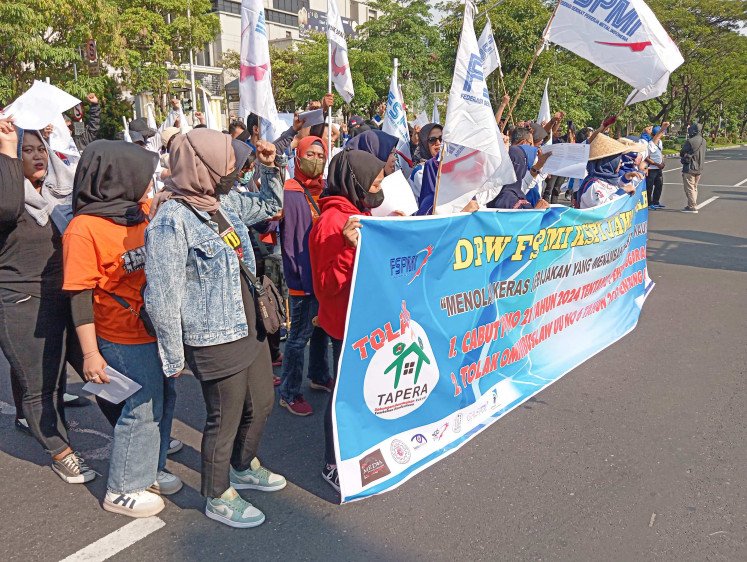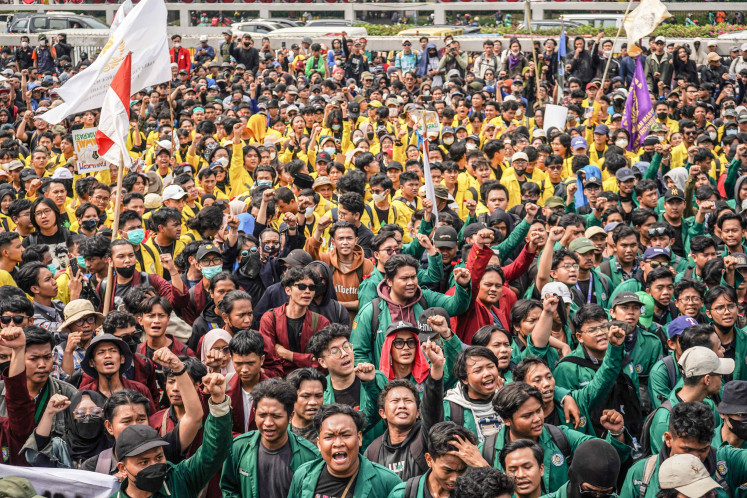So yet another year has gone by seemingly in the blink of an artificial intelligence-scanned eye.
It’s December again, and while you might be eagerly awaiting the end of 2024’s buffoonery to usher in the inevitable tomfoolery of 2025, let’s take a moment to take stock of the good, the bad and the downright bizarre stories that shaped the year.
Democracy on trial
If 2024 taught us anything, it’s that democracy is messy, unpredictable and sometimes maddening.
This year, more than 70 countries hosted elections involving nearly 2 billion voters. Across cities and countrysides alike, people cast their votes for seasoned politicians, disruptive outsiders and everyone in between, hoping for change, or at least stability.
In the United Kingdom, Labour finally ousted the Conservatives after 14 years, a seismic shift in British politics. Across the Atlantic, insurrection turned to resurrection as Donald Trump returned to the White House, defeating Kamala Harris in both the popular vote and the electoral college.

Thank you!
For signing up to our newsletter.
Please check your email for your newsletter subscription.
Indonesia, the world’s third-largest democracy, added its own twist to this year of elections. On Valentine’s Day, voters handed retired Army general Prabowo Subianto a decisive victory, making him the country’s eighth president with 58.6 percent of the vote. At 73, Prabowo is the oldest Indonesian president ever to assume office, continuing the global trend of old men in power.
But millennials and Gen Z weren’t completely left out as Prabowo’s running mate, Gibran Rakabuming Raka, son of former president Joko “Jokowi” Widodo, became the youngest vice president in Indonesian history at 37 years old.
Then-candidate Prabowo Subianto and his running mate, Gibran Rakabuming Raka, greet supporters in Jakarta on Feb. 14 after claiming victory in the first round of Indonesia’s presidential election. (AFP/Yasuyoshi Chiba)
The election wasn’t without its share of drama. From allegations of nepotism, state interference and shady one-liners at the debates, to old forum accounts dug up from the depths of the internet mausoleum, the race was dogged by controversy from every angle. But in the end, Prabowo’s landslide victory left no doubt, at least at the ballot box.
Elsewhere, the resilience of democracy faced some real tests. In South Korea, public outrage helped reverse a brief declaration of martial law, proving the power of the people even in dire times.
Takeaway:
This year’s elections spotlighted the fragility and strength of democracy in equal measure. While questions linger about the influence of AI-driven misinformation and the role of entrenched power dynamics, moments like South Korea’s civilian-led protests remind us that the people still hold the power to shape their future.
Disaster movies in real life
United Nations Secretary-General António Guterres called the year a “masterclass in climate destruction,” and the evidence was all around us. This year, the planet pushed back. Hard.
Indonesia sweltered through an unforgiving year, with air-conditioning systems working so much overtime they’re lodging a formal complaint. The highest temperature recorded was 38.8 degrees in West Sumatra in July, but the heat didn’t let up for months. By October, pumpkin spice lattes were paired with record-breaking averages of 32.63 degrees. Larantuka, East Nusa Tenggara, logged Indonesia’s hottest October day at 38.4 degrees on the 27th.
Globally, the 10th month of this year became the second warmest October ever recorded, with average temperatures 1.65 degrees above preindustrial levels. A report by the European Union’s Copernicus Climate Change Service warned that 2024 would likely surpass 1.5 degrees for the first time, a chilling milestone in the fight against climate change.
While heatwaves dominated the headlines, the other side of the climate coin was just as devastating. Unusual rainfall patterns led to catastrophic flooding in unexpected places. The Sahara Desert and Dubai experienced unprecedented downpours, while Spain endured a year’s worth of rainfall in a single day on Oct. 29, causing 3.5 billion euros (US$3.69 billion) in damages and claiming 226 lives.
Cars are piled up after being swept away by catastrophic floods in Valencia, Spain, on Oct. 31. (Shutterstock/Vicente Sargues)
The Pacific typhoon season was equally brutal, with Typhoon Yagi alone claiming 844 lives. Southeast Asia bore the brunt, with the Philippines battered by five major storms in three weeks, displacing millions and killing at least 160 people.
And yes, even turbulence made the list, with aviation experts warning it will only worsen as climate change intensifies. Singapore Airlines Flight 321 experienced such extreme turbulence in May that it resulted in one death and 104 injuries.
Takeaway:
The climate crisis isn’t a distant problem, it’s here, now and unavoidable. The 2024 UN Climate Change Conference (COP29) saw tepid progress and renewed commitments, but without urgent, collective action the disasters of 2024 may soon look like a prelude to even worse years ahead.
Hunker down: A year of conflict
With war raging across continents, 2024 often felt more like 1914. Civil wars raged in Sudan, Haiti’s gangs declared all-out war on their government and the UN mission and North Korea reportedly sent soldiers to fight alongside Russian forces in Ukraine, which escalated its counteroffensive by firing United States-supplied longer-range missiles into Russian territory for the first time.
But Gaza remained the epicenter of devastation in a shocking man-made apocalypse unfolding right before our eyes. Since the conflict erupted in late 2023, over 44,000 Palestinian deaths have been recorded. However, experts believe this number is likely far outdated, with many casualties unaccounted for due to ongoing violence. The youngest victim of the violence? A one-day-old baby.
A Palestinian boy collects drinking water in this July photo in Gaza, where the prospect of mass starvation looms large. (Shutterstock/Anas Mohammed)
Despite international condemnation, including arrest warrants from the International Criminal Court for Israeli Prime Minister Benjamin Netanyahu and key Hamas leaders, alongside accusations of genocide from Amnesty International and the UN, the killing continues daily.
Adding to the devastation, global food security experts have warned that 1.1 million Gazans are on the brink of famine, with food supplies and humanitarian aid unable to meet the desperate needs of the besieged population. As airstrikes and blockades persist, the prospect of mass starvation looms large.
Meanwhile, in Syria, a seismic development occurred as President Bashar al-Assad fled to Moscow under Russian protection after rebels seized control of Damascus. Assad’s 24-year regime came to an abrupt end, with rebels celebrating nationwide. But as everyone familiar with history knows, regime change isn’t always immediately followed by peace and prosperity.
The voice of the masses thrummed this year through the idle chatter of ballot boxes, the furious cries of protests and the desperate prayers rising from places battered by war and disaster.
Globally, a report by Verisk Maplecroft revealed a chilling statistic: Conflict-affected areas have grown by 65 percent since 2021, now covering 4.6 percent of the world’s landmass. As death tolls rise, so too does global fatigue, making solutions feel increasingly out of reach.
Takeaway:
War is reshaping geopolitics in ways that will ripple across generations. The international community’s inability, or unwillingness, to act decisively, particularly in Gaza, highlights the growing vacuum of accountability. If the global community cannot respond effectively, who will?
Housing: A millennial pipe dream?
The stereotype of millennials being unable to afford homes because of their avocado toast addiction got another punchline in Indonesia this year. Enter Tapera, the government’s revamped housing savings program, which turned the lives of human resources departments upside down when it was announced in May.
The initiative, which will take full effect by 2027, requires contributions equivalent to 3 percent of an employee’s monthly salary to a fund aimed at making housing more affordable, requiring 2.5 percent from the employee and 0.5 percent from the employer. The program is a continuation of the older Taperum-PNS (housing savings) scheme for civil servants, which fizzled out in 2020 with funds that had barely been adjusted for inflation.
Indonesians in Semarang protest the Tapera housing savings program on May 2. (Shutterstock/BanGhoL)
But while Tapera’s intentions may be noble, the impact on workers’ take-home pay is not. The announcement triggered a level of public outrage that government officials admitted they did not expect.
With property prices skyrocketing and wage growth stagnating, the fund might barely scratch the surface of what’s needed for homeownership. A minimum-wage worker could theoretically save around Rp 66 million (US$4,161) by retirement; a sum that would barely make a dent in the down payment of a 60-square-meter townhouse in Jakarta’s satellite cities, let alone grandma’s 2,000 sq m Cilandak mansion.
People protest proposed election law revisions outside the House of Representatives in Jakarta on Aug. 22. (JP/Muhammad Zaenuddin)
Adding insult to injury, Indonesians are already grappling with salary deductions for mandatory contributions to Healthcare and Social Security Agency (BPJS Kesehatan) and Workers Social Security Agency (BPJS Ketenagakerjaan). For many, the idea of sacrificing even more of their paycheck feels like a pipe dream wrapped in bureaucracy.
Takeaway:
Tapera highlights the government’s recognition of Indonesia’s housing crisis, but it also underscores the challenges of tackling the issue head-on. Without additional measures like affordable housing developments or wage growth initiatives, the gap between aspiration and reality will remain wide. Millennials and Gen Z need more than savings plans, they need a system that works for them.
Apple vs. national pride
Few things spark drama like an iPhone launch, and in 2024, Indonesia found itself at the center of a corporate showdown.
The iPhone 16, Apple’s latest flagship, failed to meet the country’s local content requirements (TKDN), barring its sale. The government mandates that smartphones sold in Indonesia must have at least 40 percent local content, a rule Apple didn’t comply with as the Rp 1.48 trillion it recently invested was short of its Rp1.7 trillion commitment.
For Apple fans, this was a catastrophe. Many turned to international resellers, only to discover that any iPhone 16 imported into the country would be considered illegal. Those who managed to snag one faced the ultimate indignity of being cut off from warranty services.
To appease the government, Apple pledged an additional $100 million investment, including plans to develop a training academy and produce components for its AirPods in Indonesia. But this was rejected for being “unfair” to Indonesia.
The Industry Ministry pointed out that Apple had invested over Rp 244 trillion into manufacturing facilities in Vietnam despite an annual sales figure of around 1.5 million units in the country, compared to Indonesia’s market-leading 2.5 million units.
So how much would be enough for Indonesia? To start with, $1 trillion for a local factory.
To foreign investors, it seemed Indonesia was being a bully, but among the public, sentiment seems broadly supportive of the government.
Takeaway:
The iPhone saga wasn’t just about smartphones. It highlighted Indonesia’s growing assertiveness as a market and its demand for global brands to treat it with respect. While Apple’s delayed launch left fans disgruntled, it showed that loyalty to brands doesn’t trump loyalty to country.
Jastip: The perils of the personal shopper
Indonesia’s Customs and Excise Directorate General found itself at the center of multiple viral controversies this year, proving yet again that when it comes to shopping abroad, nothing is ever simple.
The first uproar began with a TikTok video showing a man who was asked to pay Rp 31 million in excise duties for a Rp 10 million pair of Adidas sneakers. After digging deeper, it turned out that Rp 24.6 million of the amount was a fine for under-invoicing; a costly lesson for the delivery company, which ended up covering the fee.
Not long after, a Jakarta school for children with disabilities revealed that Customs had been holding up 20 braille keyboards donated by a South Korean company since 2022.
The reason? The school hadn’t paid the Rp 100 million in duties, despite sending multiple documents proving the items were genuine donations. Public outcry eventually forced Customs to release the keyboards, but not before the case sparked widespread frustration.
Adding to the drama, stricter import regulations were introduced in March, limiting the value and number of goods travelers could bring into Indonesia from abroad. The rules capped electronics like laptops and smartphones and set a maximum cumulative value for personal imports. The backlash was swift, and by mid-April, the government walked back the restrictions, replacing them with more lenient provisions; a rare concession in the face of public outcry.
Meanwhile, stories of arbitrary fees, damaged items and questionable enforcement continued to flood social media. One YouTuber reported being charged based on the price of a completely different item, only to receive the package with a damaged box and missing parts.
Of course, excise duties and taxes are important in maintaining state revenue and protecting domestic industries, but it’s increasingly hard to trust the notion when Customs officials are flaunting lifestyles resembling the rich and famous.
Remember the daughter of a Customs official pictured wearing a Rp 22 million Balenciaga turtleneck in 2023? The online flexing seems to have calmed down this year, or maybe they just picked something more demure and mindful from Max Mara instead.
Takeaway:
Customs’ missteps this year are a reminder that bureaucracy must serve the people rather than hinder them. With public outrage mounting, it’s clear that reform isn’t just overdue, it’s essential.
Final reflections
The voice of the masses thrummed this year through the idle chatter of ballot boxes, the furious cries of protests and the desperate prayers rising from places battered by war and disaster.
We’ve witnessed moments of joy: Nations rallying behind Olympic dreams, cultural discoveries illuminating the past and communities coming together against all odds.
Olympic bronze medalist Gregoria Mariska Tunjung poses with her medal during a ceremony at Merdeka Palace in Jakarta on Aug. 15. (AFP/Bay Ismoyo)
But despair still lingers. Memories of those lost to airstrikes, the cries of displaced families and the unrelenting grief of a planet in peril remind us of the weight of the year that was.
A mix of highs and lows, flickers of hope glimmering amid barren landscapes.
As the world (hopefully) slows down for the yearend, it’s a chance to reflect; not just on the stories that shaped 2024, but on your own.
What have you overcome? Where has this year taken you? Who stood beside you and when did you feel most alive?
And as the horizon of 2025 draws near, ask yourself: How will you face it? Despite everything, one truth remains: You’re still here.
Josa Lukman is an editor and head of the Creative Desk at The Jakarta Post. He is also a margarita enthusiast who chases Panadol with Tolak Angin, a hoarder of former "it" bags and an iced latte slurper.





























